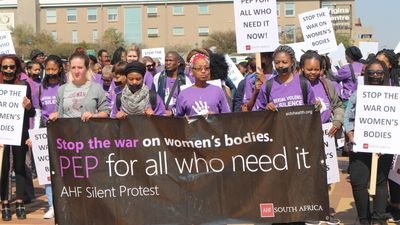We Will No Longer Be Silenced in the War on Women's Bodies
Wits University students and supporters came together in silent protest of the crimes against women's bodies in South Africa.
In the op-ed below, Mamello Sejake discusses the war on women's bodies in South Africa and taking part in yesterday's silent protest at Wits University in Johannesburg.
Most days, before I get dressed, I have to ask myself how much I can take. On days when the answer is “not much,” I’ll change what I’m wearing because the simple act of walking through town in shorts or a low-cut top adds too much to my burden. There are times, too many times actually, when I’ve felt dirty and disrespected by the harassment I’ve had to stomach outside, or that I’ve had to pretend my fear doesn’t exist while walking past a group of men whose lustful gazes I couldn’t escape.
By occupying the female form, whether you like it or not, and irrespective of how brave you are, you are constantly at risk of becoming a casualty in the war against women’s bodies.
I come from a lineage of strong women who kicked down doors and called bullshit on the belief that certain jobs and spaces are solely for men. We're lightyears ahead of our ancestors. Yet despite their unrelenting efforts,, many women––even those with fire in their eyes––continue to stand merciless at the hands of gender-based violence.
Yesterday, the student community of Wits and other supporters came together to mourn the lives that have been lost to gender-based violence, to support the survivors and stand in solidarity against despicable acts of sexual violence.
On my way through Braamfontein to the silent protest on campus, I came across people in purple t-shirts and taped mouths. There were fiery faces there to break the silence, and to lead me to a safe space where there’s support, and where I could have a voice.
As I stood there, in the sea of silent-protesting women and men, I felt these words burn into me: “she needed a hero, so that's what she became.”
The silent protest represented support from a community who understands and who has had enough. Above an assembly of frustrations, pains and memories of our harboured fears, there was a reminder that if there is to be any kind of victory, it must take flight from spaces like these.
Yet inasmuch as it was uplifting to be there, there was real pain. To see so many young people in t-shirts that read "survivor" and "rape survivor," and to hear stories of sexual abuse from so many of my peers, it made me cold.
Back in the comfort of my home, a quick look at reality is infuriating. Ten years ago, our president, Jacob Zuma, was accused of rape. He was defended by an army of supporters. South Africa, our home, is the rape capital of the world. There’s even a special kind of rape unique to this country––corrective rape––by which rapists specifically target lesbians. The definition of rape remains unclear, and not every case of sexual assault is reported out of fear that what comes after will be worse than being violated. We're surrounded by people who still believe that dressing a certain way or acting a certain way can warrant a savage’s actions.
I get angry thinking about it and I get angry talking about it. I also get sad. When it comes down to it, my anger and my courage to fight against sexual violence mean nothing when up against a man who's set on holding me down so that he can insert a grenade into my body.
Patriarchy and the silence forced over victims of sexual abuse must fall. They must be buried deep under the ground that we stood on yesterday in solidarity against it. The war against women’s bodies must stop––and it will, when we all show up and say “we’ve had enough!”.
Mamello Sejake is a gender studies graduate with a keen interest for social development as well as sharing information through storytelling.
